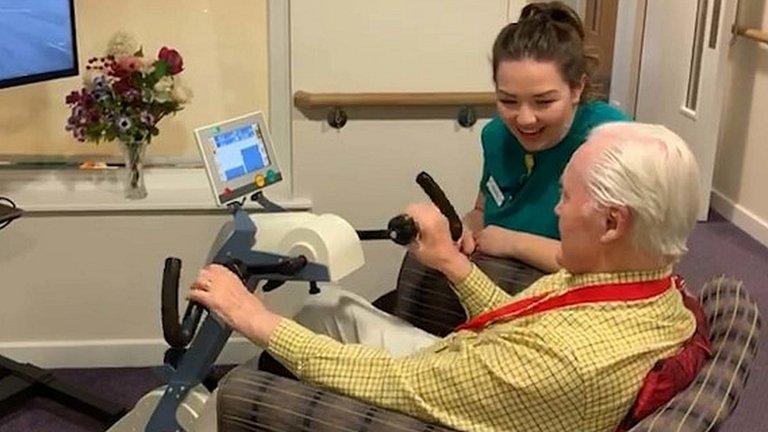Coronavirus: England's councils 'face large-scale' cuts to services
- Published

Councils are responsible for adult social care
Some of England's biggest councils could see "large-scale reductions" to services as they attempt to balance the books, new analysis says.
A report for the County Councils Network found that 39 local authorities face a funding shortfall of £2.5bn.
It warned councils may have to "use up" all their reserve money by next year to deal with the fallout from coronavirus.
The government said it was giving councils "unprecedented" support including £3.2bn in emergency funds.
The pandemic has put pressure on local councils with increasing costs of social care and support for the most vulnerable, while income from fees and charges have fallen sharply during the lockdown.
There is also concern that revenue from council tax and business rates will significantly drop as the country faces a recession due to the economic turmoil of coronavirus.
Raising the issue of council funding at Prime Minister's Questions, Labour leader Sir Keir Starmer warned council leaders faced a choice between "cutting core services or facing bankruptcy".
"Either outcome will harm communities and mean local services can't reopen," he said.
"That will drive up poverty, something the prime minister says he doesn't intend to do."
He quoted the Conservative leader of Lancashire Council, who said the overall financial impact on councils will be "far in excess of the £3.2bn provided to date".
Prime Minister Boris Johnson replied that the government had provided £1.6bn to support councils on the frontline and £600m to social care as well the £3.2bn funding to councils in general.
He said the country can be "very proud" of its investments and the response of local government officials.
"There are some councils, particularly Labour councils alas, that are not opening their schools when they could be opening them," he said.


This isn't the first time local authorities have warned about the impact of this crisis on their finances - and it's unlikely to be the last .
Council budgets have been stretched for some time with social care under particular strain.
The problem has been exacerbated by this virus, with care costs climbing and usual income streams falling.
The government has made more money available, but many local authorities have said it falls short of what's needed.
A few councils have quietly suggested they might get to the point they can't legally balance the books, and may have to effectively declare themselves bankrupt.
Others are suggesting further cuts to services will be necessary to meet the shortfall.
Ministers say they are working on a comprehensive settlement to make sure the sector is sustainable.
With the government facing huge demand for financial support in whole range of areas, councils want to make sure their voices are heard.

Second wave concern
The report into the finances of local authorities, carried out by accounting firm Grant Thornton UK LLP, found that county authorities could be "particularly vulnerable" in the event of a second wave of the coronavirus.
If there was further outbreak, followed by another lockdown, the report estimates councils could face a shortfall of £4.5bn over the next two years.
The report suggests the government should provide financial support to ensure councils do not run out of money.
The County Councils Network is made of 36 local authorities, 32 of which are Conservative controlled. Cornwall and Herefordshire are controlled by independents, while Cheshire East and Durham are Labour-controlled.
Councillor Carl Les, finance spokesperson for the County Councils Network and leader of North Yorkshire County Council, said local authorities are "grappling with increased cost pressures".
"We want to work with government to develop a comprehensive plan to support councils over the coming months and years."
Minister for Local Government Simon Clarke said: "In total, the government has provided over £27bn to support local councils, businesses and communities in fighting the pandemic, including £600m to help reduce the infection rate in care homes and £300m to support track and trace."
He added the government was working on a "comprehensive plan to ensure councils' financial sustainability over the coming year".
- Published17 May 2020

- Published28 April 2020
